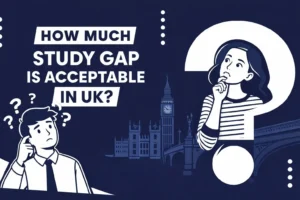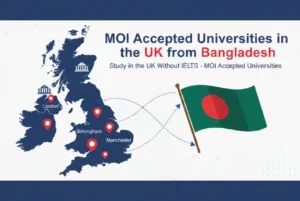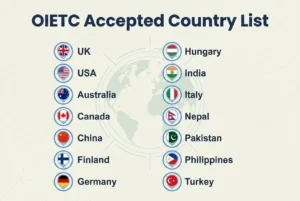Do you want to study abroad in Canada? Or, do you want to send your child to study in Canada? The higher education system in Canada’s ten provinces includes their historical development, organisation and goals. The ideal objective of Canadian higher education is to offer students the opportunity to acquire the skills necessary to realise their utmost potential.
In this blog, we will discuss the higher education system in Canada for international students. So, if you plan to apply for a student visa in Canada, this blog will greatly help you.
How is the Higher Education System in Canada?
According to the higher education system in Canada, each province and territory is in charge of all levels of education, including universities and colleges. There is no national education system across the whole country. Instead, each province and territory follows its own rules to make sure education stays at a high standard.
Academic Year in Canada
Canada’s higher education system includes universities, colleges, and polytechnic institutes. Universities in Canada offer bachelor’s degree programs, while colleges and polytechnics focus on shorter, job-oriented programs that might not offer bachelor’s degrees.
Most colleges and universities in Canada use a two-semester schedule. The first semester starts in September and ends in December, and the second semester runs from January to April or May.
A bachelor’s degree usually takes four years to finish in Canada, though some students might be able to complete it in three years.
Grading System at the Universities in Canada
The university grading scale measures how well students do during their degree. It helps decide if a student will get their degree, how good their academic performance is, and if they can move on to further studies like a master’s degree.
International students are judged by the grading system to see if they qualify for admission to a course. This is important when transferring between universities or using high school grades from another country to apply for study abroad.
In the higher education system in Canada, GPA (Grade Point Average) is usually based on a 4.0 scale, though in some places like Ontario, it can go up to 9.0. To get admitted, international students generally need a letter grade of B or a GPA of at least 2.67.
Types of Higher Education Institutions in Canada
There are two types of educational institutions in Canada. Such as- university and college. Let’s explore the education institutions in Canada.
University
Universities in Canada are publicly funded but run mostly on their own. They can set their own admission rules, academic standards, and degree requirements, and manage their finances and programs.
There are more than 10,000 programs and degrees available in Canada, including undergraduate, graduate, professional, and certificate programs. Some universities also offer shorter programs that lead to certificates, diplomas, or professional degrees.
Students usually take three to four years to complete a bachelor’s degree at university. After that, they can choose to continue their studies with a master’s or doctoral degree. A master’s degree usually takes one to two years to finish.
College
Colleges in Canada can be either private or public. In both cases, students need to pay tuition fees, but public colleges are usually much cheaper.
There are two main types of colleges in Canada: community colleges and university colleges. Most colleges focus on practical, career-oriented programs, but they also offer general courses like English, Math, Science, and Psychology.
If you study full-time, it usually takes three to four years to finish an undergraduate degree. To apply for a master’s degree, you usually need an Honours degree.
Admission Requirements for Higher Education in Canada
All colleges and universities in Canada have an admissions process to select students. How competitive it is depends on the type of school, program, and the student’s qualifications. Let’s explore the admission requirements for higher education in Canada. In general, the application process in Canada includes these requirements:
- Secondary School GPA and scores on SAT and AP
- Passport
- CV
- Personal Statement
- Reference letters
- Recommendation letter
- English or French language proficiency tests, etc.
Undergraduate Admission Criteria in Canada
High school students usually compete the most for spots in undergraduate programs. To get in, the two most important things are finishing high school and being able to speak one of Canada’s two main languages: English in most areas, or English or French in Quebec and New Brunswick.
Students can choose from programs like Arts, Science, and Business, with many options and specializations within those fields.
Graduate Admission Criteria in Canada
To get into a graduate program, you usually need to have already completed an undergraduate degree, though there are some exceptions. Graduate programs involve more independent research and less coursework, so students need a good understanding of their field to research on their own.
Typically, a student will need a supervisor (a professor) to support their application to graduate school. Students usually look for a supervisor who works in a similar field of interest by interviewing different supervisors to find a match.
Cost of Higher Education in Canada
Studying in Canada is quite affordable compared to many other countries. On average, you’ll need between C$20,000 and C$30,000 per year for tuition, though the exact amount will depend on the school and program you choose. For living expenses in Canada like housing and food, the cost will vary based on where you live and your personal needs, but a common estimate is around C$15,000 per year.
Top Universities in Canada for Higher Education
Previously we have discussed the higher education system in Canada for international students. Let’s explore some top Canadian universities for taking education in Canada.
- Laurentian University
- International Business University
- Trent University
- Fanshawe college
- University of Canada West
- Niagara College Toronto
- University of Niagara Falls Canada
- Toronto School of Management
Differences Between the Education System in Canada and Quebec
There is little difference between the education system in Canada and Quebec. In Quebec, the word “college” means something different than in the rest of Canada. In Quebec, “college” refers to a two-year pre-university program or a three-year program for specific careers. After finishing one of these programs, students can go to university for three years to earn a bachelor’s degree. After that, they can continue with a graduate program, which usually takes one to two years for a master’s degree and three or more years for a PhD.
In other parts of Canada, “college” refers to a technical school or community college where students can earn certificates, diplomas, or associate degrees. At a university, students can take undergraduate or postgraduate courses (if they have an honours degree). In graduate school, students can earn advanced certificates, degrees, or diplomas.
What Should You Do After Completing Your Higher Education in Canada?
One of the great benefits of studying in Canada is that after you graduate, you will qualify for a postgraduate work permit in Canada, which lets you stay and work in the country.
Canada is a top choice for higher education abroad, and there are many opportunities to build a career in academia. Doing a PhD in Canada is usually cheaper than in the U.S., and some universities may even lower or cancel international fees for strong candidates.
If you complete a PhD at a Canadian university, you can stay and work in Canada for another three years. After that, you can explore options like becoming a permanent resident or even getting full citizenship in Canada.
Final Words
The higher education system in Canada is known worldwide for its high quality and variety of programs, attracting students from all over the globe.
Higher education in Canada is mainly offered by universities, colleges, and technical institutes. These schools can be either public or private. Public universities get money from the government and are overseen by provincial or territorial governments, while private universities run independently and rely on student fees and private funding. However, if you are interested in taking higher education in Canada, you can always contact AIMS Education.





